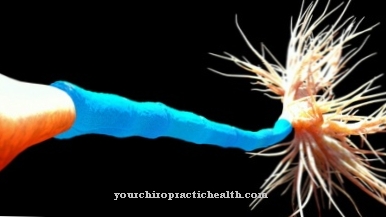Numerous diets suggest that a greatly reduced energy intake is beneficial in order to lose a lot of weight as quickly as possible.
Such behavior is permanently detrimental both to health and to the desired weight loss.
As soon as the Starvation metabolism switches on, further weight loss is associated with difficulties, as vital functions are reduced.
What is the hunger metabolism?

Metabolism is understood to mean all processes that take place in cells. This concerns both the construction and the dismantling process.
Every cell needs energy so that all body functions can be maintained. The absorbed nutrients enter the blood through the intestines. The blood cells transport the various elements to the cells. In the cells, in turn, the substances are transformed into others.
Metabolism is important for losing weight. In the course of biochemical processes, energy is obtained primarily from carbohydrates. However, if there is a permanent undersupply of nutrients, the organism reduces the basal metabolic rate and goes into starvation metabolism. In this way, the reduced calorie intake does not lead to any further decrease. Instead, even more weight can be stored.
Function & task
In the past, hunger metabolism ensured the survival of mankind. If there was an episode of food shortage, the organism slowed down its metabolism. In this way survival could be ensured despite the small amount of energy added.
Today, however, there is a significant excess of food in most western countries. Thus, the starvation metabolism results in obesity as soon as the phase ends and an appropriate level of calories is consumed.
The slowed metabolism leads to a lower need for energy. Excess calories are stored and fat deposits accumulate. These are supposed to protect the body from another episode of starvation and are part of an inherited trait that was useful a few centuries ago.
The hunger metabolism does not set in with every diet. Only when the absorbed energy falls below a certain limit does the process slow down. Experts assume that the calorie deficit should be a maximum of 500 calories below the total requirement in order to avoid starvation metabolism.
Up to a certain deficit, the body uses up existing energy reserves to compensate for the inadequately ingested food. So he can use around 150 grams of triglycerides a day. Most of the energy is used for vital organs such as the heart, brain and kidneys. There is a breakdown of triglycerides, which are converted into glycerine and fatty acids.
The metabolic processes of glucose, glycerine and amino acids provide the body with energy. However, if the food shortage persists, the processes continue to change. Overall, the organism can reduce its metabolism by around 50 percent. From a certain point in time, for example, the brain uses only 30 percent of the energy that is available with adequate food intake.
As soon as no carbohydrates are available, the muscles start to break down. Proteins are actually used to build structures. However, if sugar is withdrawn from the body, it metabolizes muscle proteins. The loss of muscles further reduces the basic energy metabolism.
The breakdown of the heart muscle is also considered relevant. Overall, the hunger metabolism can lead to a 25 percent muscle loss.
Illnesses & ailments
The starvation metabolism can lead to some complaints. Weight loss after the hunger phase is over is very important. The metabolism is now running at a much lower level. Due to the breakdown of muscles and the reduced use of energy in some organs, only a smaller proportion of calories are burned. The intake of an increased amount of energy then leads to the build-up of fat reserves. In this way, the starting weight often increases. At the same time, the termination of the starvation metabolism takes a longer time. Thus, the energy requirement is limited in the long term.
However, regular food intake is necessary to bridge the changed processes. Obesity cannot be ruled out.
In the context of starvation metabolism, not only the metabolic processes change. Hormonal imbalances occur in women in particular. Menstruation can be absent for an indefinite period of time, which can lead to further discomfort.
In children, the reduced calorie intake can lead to stunted growth. In this way, incomplete physical development cannot be ruled out. This also applies to embryos whose mother shows a starvation metabolism. If they develop in such a state, physical and psychological complaints can often be perceived after the birth. On the one hand, the birth weight of the unborn child can decrease, and on the other hand, the child is often born earlier if there is an insufficient supply. These two factors in particular provide a breeding ground for further complications.
If the body's own proteins are metabolized as part of a permanent calorie deficiency, urea excretion is often reduced. Some people develop so-called hunger edema.
Overall, a weakening of the immune system can be determined. This also increases the risk of infection. For example, a cold or other illness occurs more often during fasting.
If starvation continues for a very long time, death cannot be ruled out either. This occurs when about a third of the proteins have been destroyed for the benefit of energy production by the body. Research has shown that healthy people can survive without food for 30 to 200 days, provided that there is enough fluid available.
























.jpg)



